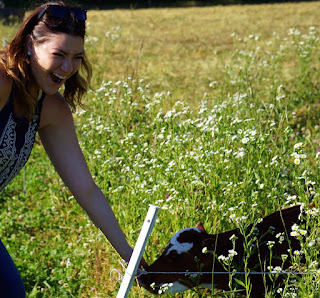It’s been said that we are the product of the five people with whom we spend the most time. In my case, I am (very luckily!) the composite of my kind and talented research partner, Clare Salerno, and my brilliant and enthusiastic research mentor, Dr. Nels Paulson, as well as my two charming roommates and, of course, the houseplant that sat atop my desk as I researched Non-Operating Landowners and BMP Lease Agreements in Dunn and Baron County, WI at the University of Wisconsin-Stout this summer.
While the idea of reflecting the values and characteristics of the people we hang around with most seems obvious, it has powerful implications in every scenario to which it is applied—be it the workplace, personal relationships, or otherwise. In the case of our research, we found that Non-Operating Landowners who have close relationships with their tenants and are connected to other Non-Operating Landowners through groups and organizations (such as Farmer’s Unions, sportsman’s clubs, and church groups) place a higher value on the preservation of their farmland and are more likely to include Best Management Practices in their lease agreements with the farmers who rent out and farm their land.
Our research was motivated by curiosity about people who own farmland but do not farm it themselves. These Non-Operating Landowners (NOLs, as we called them) own roughly 40% of the farmland in the United States and rent it out to one or more tenant for farming. The relationships between NOLs and tenants are diverse. After mailing surveys to over 900 non-operators who own land in Dunn and Barron counties, we observed NOL-tenant relationships that varied from “very close” to “very distant”—with some NOLs requiring written lease agreements, while others were satisfied with a verbal promise of stewardship and a handshake. What most interested us, however, was why some of these lease agreements required best management practices (BMPs) while others did not.
 |
| LAKES REU research poster presented at The Raw Deal on Thursday, August 4th, 2016 |
We found that NOLs who have closer relationships with their tenants (i.e., visit the land frequently and have conversations more regularly) were more likely to include BMPs in their lease agreements. Further, NOLs who were connected to other NOLs through local organizations and groups placed a higher value on the preservation of the land and were also more inclined to include BMPs in their lease agreements. This kind of social interaction between NOLs and from NOL to tenant is very important for knowledge transfer about land management and for shared value of land conservation and BMP usage.
So what do we do with this information? Being informed and aware is certainly a step in the right direction, but what does knowing this information really do to help clean up the Red Cedar Watershed? Put plain and simple—not much. Knowing that NOL-to-NOL social interaction and communication between NOLs and tenants is important serves as a good starting block, but until we actually push back and take off running, nothing is going to change. So what do we do?
We must take action. It is important for NOLs to become more civically and socially engaged for both long-term vitality of their land and for the betterment of the watershed. Just as members of a book club meet on a regular basis to exchange opinions and discuss ideas about the books they have most recently read, there needs to be a space for Non-Operating Landowners to congregate and discuss matters relating to their land practices and their relationships with their tenants. NOLs need to be connected to one another and to their tenants so that they, as like-minded individuals in similar circumstances, can discuss matters relating to their land and then apply them.
 |
| An Illinois State University Senior and 2016 LAKES REU participant, Alexis Econie is the No. 1 Fan of West Central Wisconsin and baby cows. |
We all know that the people we spend the time with shape our ideas, values, and actions—but what many of us do not see is that moving toward a cleaner watershed may be as simple as getting people connected. So, Wisconsinites, let’s get talking!

I like this a lot! Super cool, maybe you could start a NOL networking site.
ReplyDelete